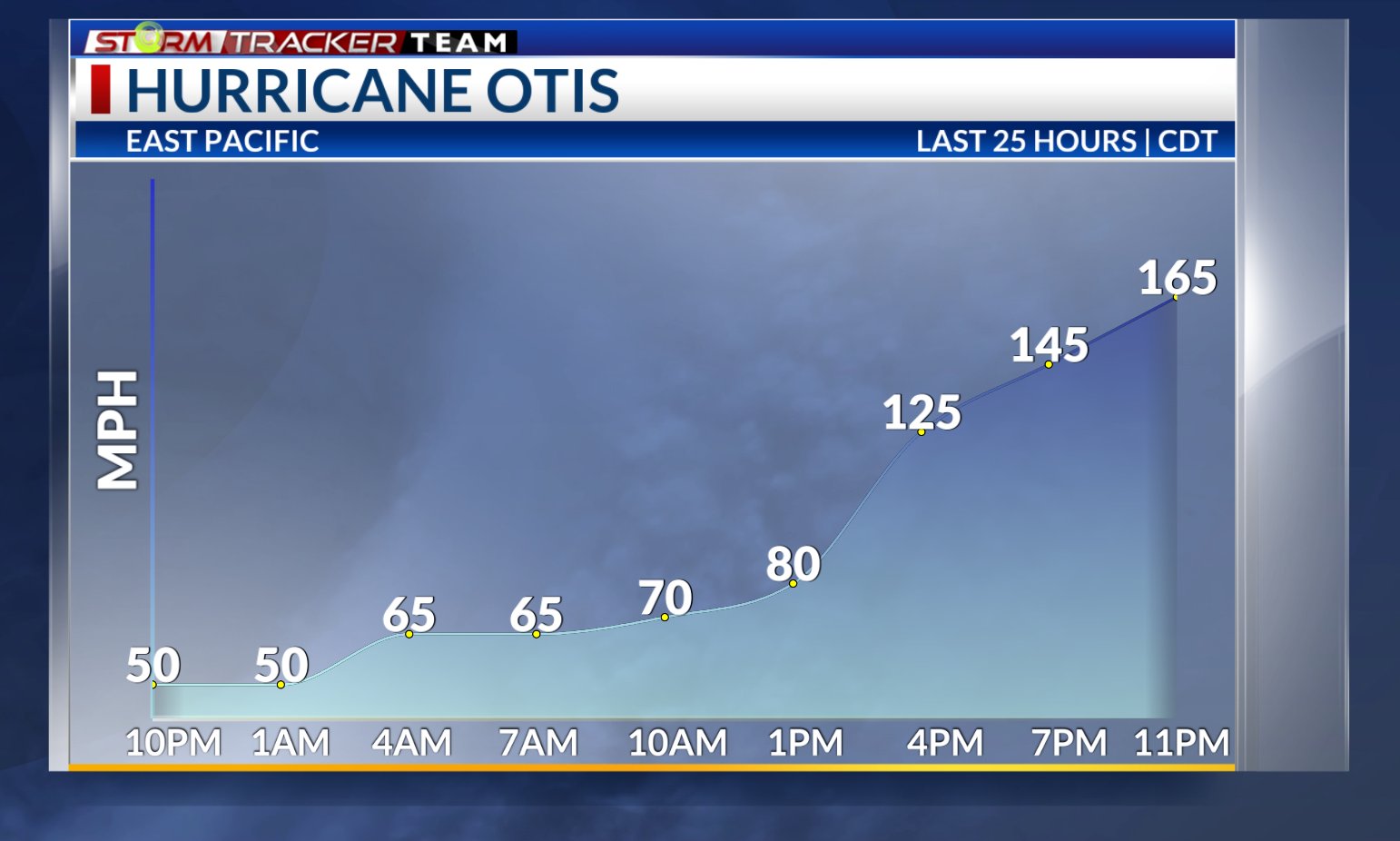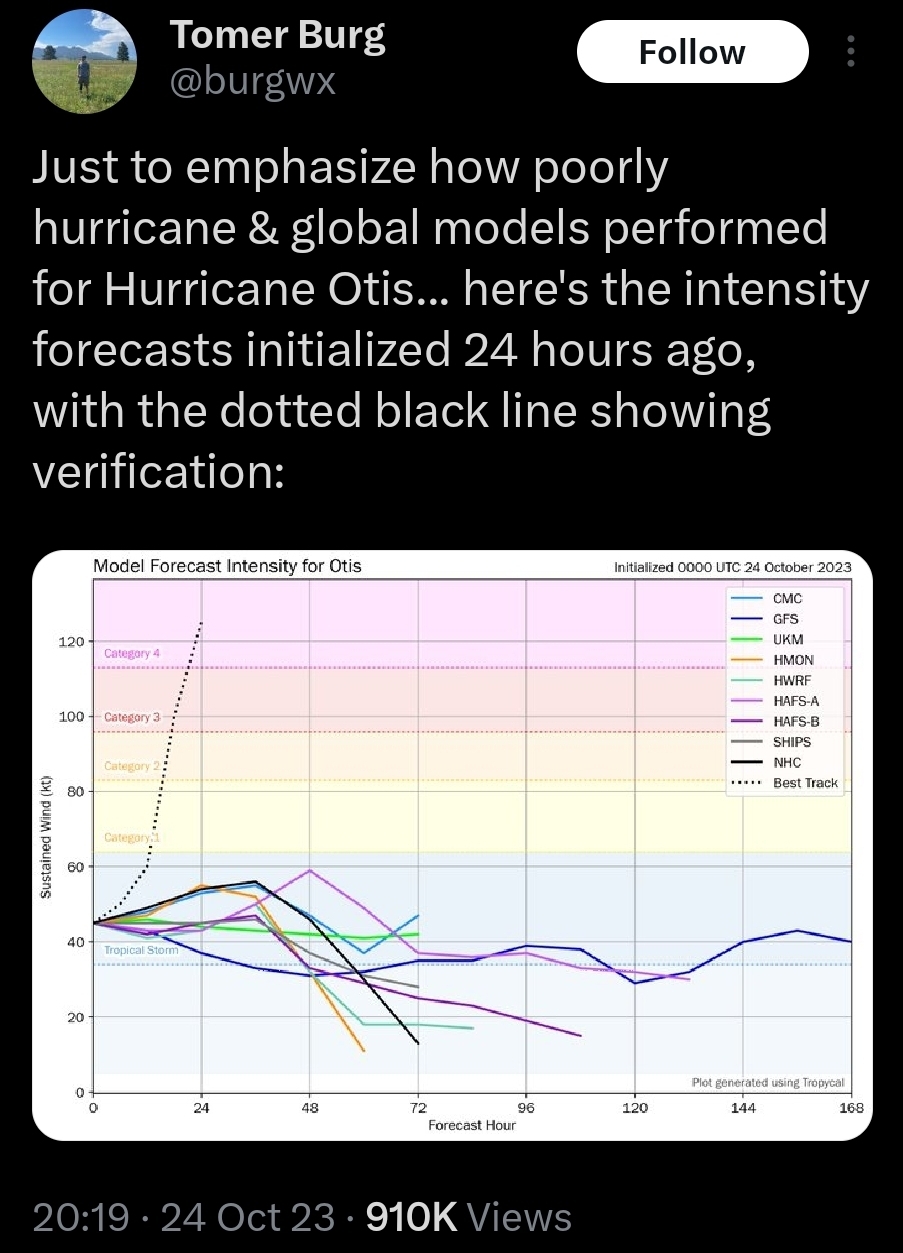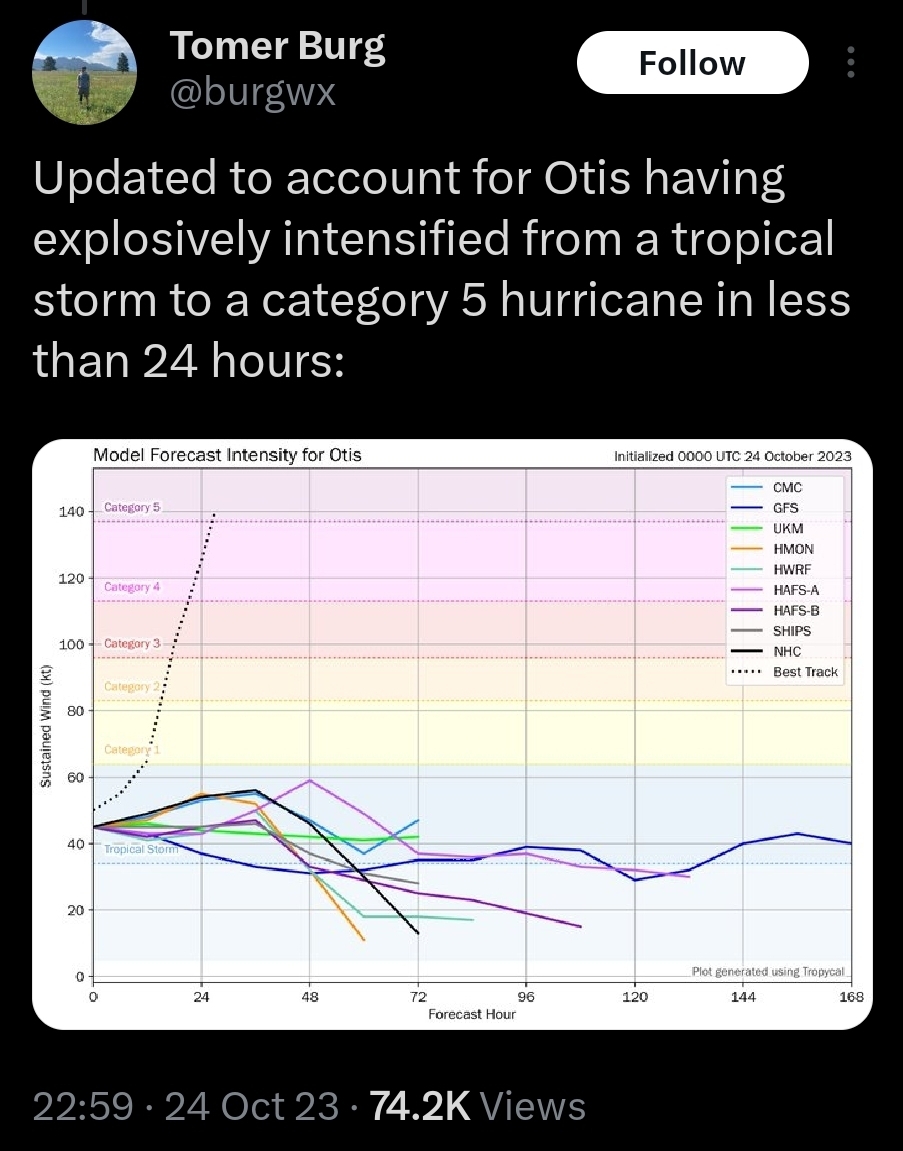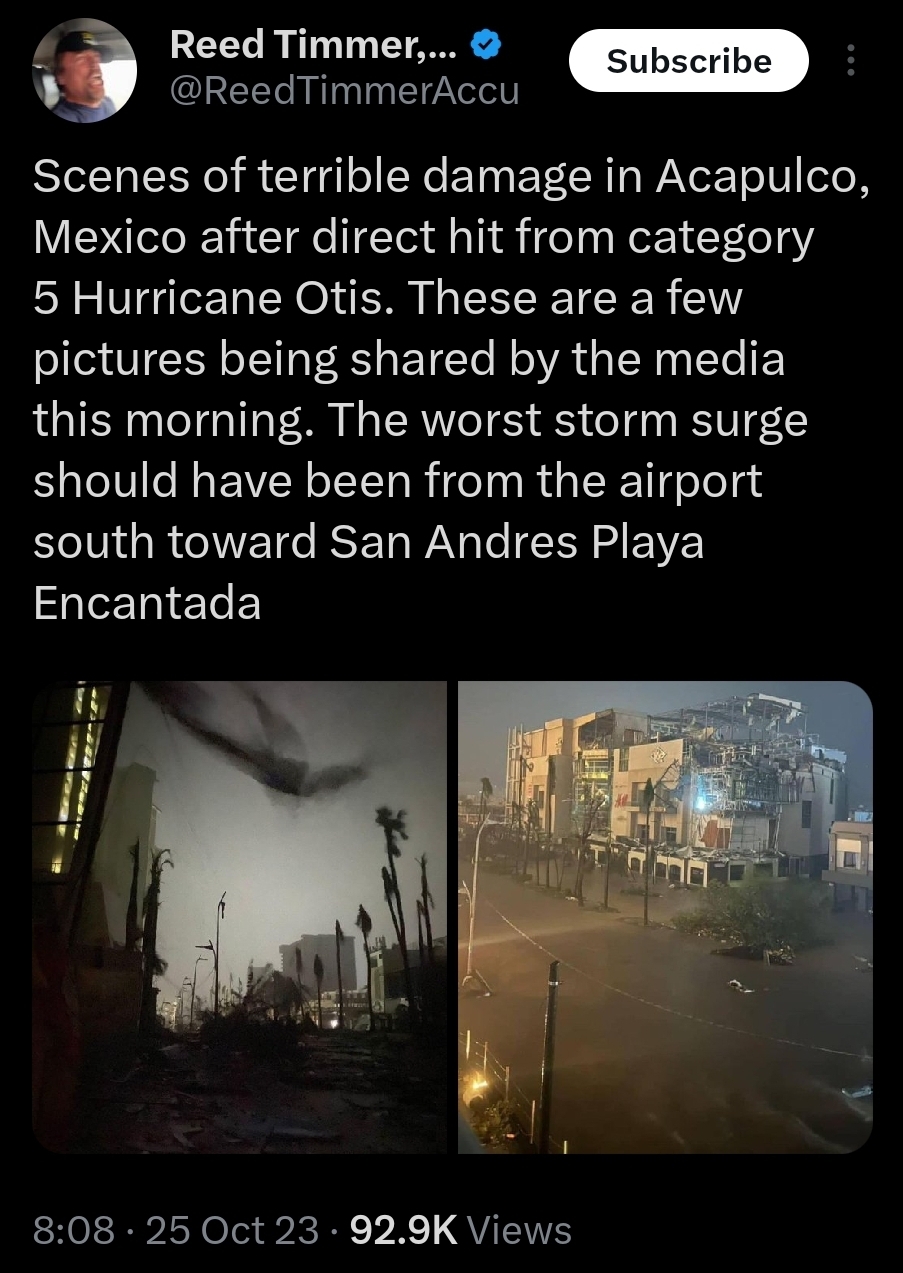It's great how our models keep failing in the direction of "we underestimated how catastrophic this would be." That surely bodes well for the future.
I had that argument yesterday. We're creating predictive models based on extrapolating based on current trends and get totally tripped up by conditions that have never been previously observed. We're at a collective cognitive loose end where we need to be able to anticipate what's going to happen but don't have any precedent to draw on.
Right. In the literature about computational modeling, we call this kind of thing "structural model error." It's an especially nasty kind of uncertainty, because none of the standard tricks that we use to account for other sorts of error in our computational modeling (ensemble modeling, parameter perturbation, multiple model runs, &c.) can really deal with it. There are two big assumptions that underpin how we use computational/numerical models (both in climate science and elsewhere): first, that our models are approximately true, and second that approximately true models will yield approximately true predictions. If we turn out to be mistaken about either of these things, the predictions our models are generating might (in the worst case scenario) end up being worse than useless--they might be actively misleading in the sense that they tell us that very low probability events are nearly certain to happen and very high probability events are extremely unlikely to happen.
The likelihood that we've gotten something deeply wrong in our modeling--that there's some major feedback mechanism, dynamic, pattern, or whatever that we're simply not accounting for--and thus that we've subject to extreme structural model error grows larger and larger the further we get away from the region of a system's state space in which our models were trained. As we push the climate further and further into unprecedented temperature ranges that aren't reflected anywhere in our observational data, it becomes more and more probable that we're going to trigger some really significant feature of the system that will give us a qualitative change in dynamical form, rendering our predictions useless (or worse) until our theoretical understanding catches up. This possibility is something that keeps a lot of climate scientists (and philosophers of science who are engaged with this stuff in a detailed way) up at night. We have no real way of knowing if we're approaching a region of structural model error until we're already there, and we don't really have any way of dealing with the error once we get there (or, at least, no way that anyone has figured out yet). It's good stuff.
That's really interesting! Do you have a high-level overview reference that I could use to ~~bash my colleagues over the head with~~ start a conversation in the office about the assumptions we're making in our modeling work?
"The Myopia of Imperfect Climate Models" and "Laplace's Demon and the Adventures of His Apprentices" (both by Roman Frigg) are both pretty good overviews of the problem. The former is more of a specific case study with some considerations about general lessons, and the latter discusses the problem by extending the "thought experiment" of Laplace's Demon. I've got a couple of publications on this too, so if you have questions let me know.
Thank you so much!
New unpredicted patterns gives us new data which gives us a better understanding of how the weather works, which gives us better models.
"So now that we have as close to definitive cause and effect data about ocean temperatures and hurricane intensity as we can get will you finally accept the urgency to do something about climate change?"
"lol no, don't be a sucker, this is evidence of a secret Chinese hurricane gun!"
I've been saying for a while the day we immediatly switch from "it's not happenening" to "its too late there's nothing we can do about it now and no way we could have known" is going to be a real test of my resolve
its too late there's nothing we can do about it now and no way we could have known
I can think of something to do that'd make a lot of people feel better, if nothing else...

that is some wack shit. that rate of change is unreal. it absolutely is heat driven.... look at how much it jumps up during the hottest part of the day.

Fucking terrifying, glad I don’t live in hurricane country anymore. But, when I did, I wouldn’t have sweat a TS at all, whereas a cat 5 would have me running for the hills. 24h is not enough for any kind of preparations. I am sure many were killed.
I’ve said it elsewhere; climate change is a lottery where if you lose you lose everything, and every year your odds get worse.
Look it would cost money and it's not even america and actually china produces the most greenhouse gas and it's really not a big deal.
Possibly my favorite reddit post ever was when there was a circle around China and India and a circle around America and Canada and the post was "the smaller circle actually produces more carbon dioxide"
And then I got downvoted when I said yea there's twice as many people there and the emissions are 1.25 times as high so theyvwere doing better than us.
Literally the meme of putting the water in the taller test tube and the child pointing enthusiastically.
I thought libs understood "per-capita" figures... Oh right 
Seems wild how bad forecasts were
The forecasts were made using available data, as we keep having unprecedented years it is going to be harder and harder to have a functional weather forecasting system
what is double crazy is how much improved instrumentation and analytic processes / computation has become over time, and how none of that matters with shit like this. in disclosure, i am a consumer of climate prediction center data and analysis to develop resources for public distribution to interested audiences. it only accounts for probably like 5-10% of what i do for work, but about a dozen or so times a year, i look at all the longer range outlooks from the national climate prediction analysis and look at the near term forecasts and put together a little regional meta-analysis. then, like pfft probably several hundred times a year, i look at near term forecasts and relay info to people about events, usually just for my own edification and the interest of certain parties. i guess the tldr is that i am a weather nerd. i love to talk about weather patterns and signifiers, historic and current. common phenomena. TEK, folk wisdom, radar visualizations and satellite imagery. i have multiple apps on my phone, because no single app is the best at everything i want from a weather app.
this has been going on for years with me. ever since i worked primarily outdoors. nearly 15 years ago, i read this pretty dope environmental history of the tallgrass prairie (Madson's "Where The Sky Began" published in 1982). anyway, at one point in it, he's talking about early plains dwellers. maybe only 1-2 generations on the land and the intense extremes of the continental climate in the deep interior of north america. very hot, high humidity summers. brutally cold winters. and most importantly, severe temperature shifts. anyway, he brings up this event that happened long before there was a national weather service or anything like it. it was some warm late winter/early spring day, clear skies, sun is bright and shiny. no snow on the ground. everything seemed ideal for a big hunt. whole communities go out to supplement their dwindling winter stores to their various spots. anyway, long story short an ice storm swoops in, temperature drops like 60 degrees super fast, visibility goes to shit, and almost nobody even makes it home the mile or so they had walked to their hunting grounds before freezing to death.
i've lived probably half my life far from temperate climates and it made me appreciate the NWS much more, because sometimes the forecast says some insane shit is coming and i swear to god you spend all day outside getting ready for it without a hint of anything wrong headed your way.
part of me knows that's the sort of world we are transitioning into, and unfortunately for america we don't have any sort of community civil defense / disaster preparedness & emergency management institutions worth a shit anymore. cuba is light years ahead of us.
cuba is light years ahead of us.

folk wisdom
yooooooo hit me with some of this, what are the best folk wisdom tidbits youve heard about weather?
Death to America
I don't know any off the top of my head, but I know a lot of people who swear by the Farmer's Almanac for weather.
Government officials, police, and the military are sent in to move furniture and other belongings to higher ground or somewhere else safe.
such a simple act to protect people's property.. this is what a functional socialist state looks like.
*clutches pearls *Good god won't someone think of the furniture /s
Its crazy those models were so off
Climate science unfortunately tries ro be really conservative to avoid criticism of being hyperbolic.
Unfortunately this results in still being called hyperbolic even as the models repeatedly underestimate.
end animal agriculture ~~today~~ 50 years ago
This scares me. I was so nervous going through this record-shattering summer and reading some of the posts on this stuff here.
I heard from a reliable source that Hamas was behind this
chapotraphouse
Banned? DM Wmill to appeal.
No anti-nautilism posts. See: Eco-fascism Primer
Slop posts go in c/slop. Don't post low-hanging fruit here.



